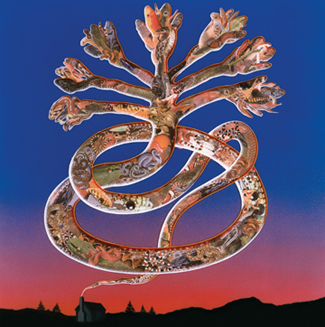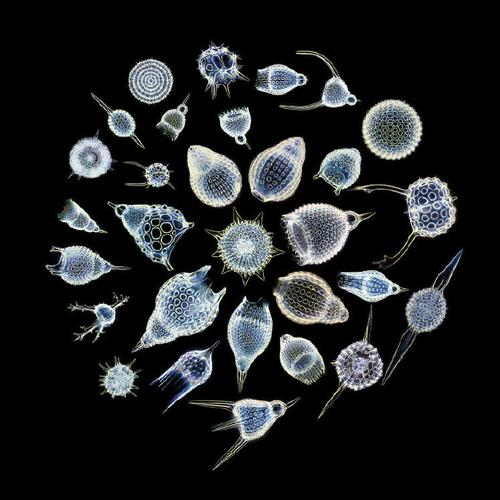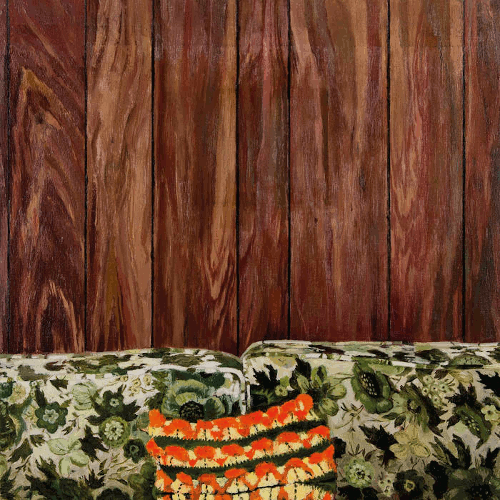Irregular #5
The South Bank Centre, London
8th-10th April 1999
The last five to ten years have seen an exponential rise in the number of intriguing events at London’s premier Arts Council-funded cultural centre on the South Bank of the River Thames, thanks to an innovative booking policy and the success of the events themselves, expanding the venue beyond its associations with Radio 3 “serious” music concerts and other more traditionally high-culture performances into the staging of events such as the London Musician’s Collective’s Annual Festival of Experimental Music and the recent Atari Teenage Riot gig which resulting in the closure of the venue due to crowd over-enthusiasm. Following on from the Meltdown series of festivals held each year, with past guest directors including Laurie Anderson and John Peel (this year’s is Nick Cave), Daniel Miller, founder and head of Mute Records, was invited to draw up his wish-list for a three day event, building on the label’s Irregular series of events of the last few years.
Thursday night opens with a surprise screening at The Royal Festival Hall of the recently-released Can Documentary (part of the Can Box of live CDs, book and video). Played through the excellent sound system and projected at full screen size, the film is even more joyful to watch than on video tape, as Can reveal their clownish as well as highly influential and inventive side through the feature-length history of the band. The main event is the premiere of Barry Adamson & Mute All Stars music for A Page Of Madness (1926), Teinosuke Kinugasa‘s distinctive silent work which deals with psychological and emotional turmoil in a lunatic asylum. For the performance, Adamson has assembled a stellar crew of former Derek Jarman soundtrack collaborator SFT (Simon Fisher Turner), avant-garde clarinetist Andrei Samsonov, Pan Sonic and Add N To (X) – with special guest Nick Cave
at the piano.
With the ensemble improvising each to an assigned area of the film, the resulting accompaniment is (presumably) somewhat different to the anything pianists in the Twenties could have acheived – a rolling, sometimes raucous, fusion of the samples and effects of Adamson, the Theremin and analogue synths of Add N To (X), and the thunderous, marvellously bassy oscillations from the Finnish contingent. Samsonov’s reeds add a haunting, melodic element, while SFT brings keyboards and occasional guitar into what is both an extremely powerful and earthshaking experience. However, once the initial physicality of the music and sometimes disturbing imagery on the screen has settled in, there’s not very much change of tone through a gruelling hour or so, except for the scenes of relatively normal life outside the asylum, when Cave returns to the piano to contine the song he opened over the titles (and closes the film with), now accompanied by the rest of the All-Stars. Draining, and decidedly equalling the intensity of the cinematic events which it attempts to score, the music fails to satisfy completely, though pumelling with great force if less conviction.
Console open the Friday night of German music in the Queen Elizabeth Hall with a poppy blend of Electro and Electronica, exuding a pleasant Air-like lightness and the odd song about buying a new hard disc sung through a vocoder. Next up are Kreidler, a band who have been known to rock live like a combination of Hawkwind and Stereolab when the mood takes them. Tonight, technical problems delay the first song and seem to discourage them from much in the way of engaging fully with their material. Sticking mostly to songs from the recent Appearance And The Park album, their delivery is averagely mid-range, and the troublesome digital keyboard of Eighties vintage soon begins to lose its tinny charm, though the cycling sample loops and relaxed Motorik drumming are still effective in their eccentric circularity. Close relations To Rococo Rot are on top form tonight, bringing their own new release The Amateur View to splendid life, and filling the auditorium with Stefan Schneider‘s wonderfully cavernous bass, and the perfectly-concocted stew of reglitched and distended sample sequences and metronomic drum grooves of the Lippok brothers, and despite one heckler’s comment that they are “Boring, like Radio 2 with the testcard” (oh, if only….), are enthusiastically received by the audience; and deservedly so.
The main attraction of the night, and the whole event, are of course Faust. Opening to the thumpingly primitive powerhouse beats of Zappi Deirmaier and the rising, gorgeously distorted electric organs of Joachim Irmler from behind a stagefront scrim, the group emerge from shadows into light as the monstrous sound of Michael Stoll‘s double and electric bass, Steven Lobdell‘s expressionistic guitar and the mechanist klang of Lars Paukstat‘s array of bars and pipes fill the room with noise. Taking the most recent studio album Ravvivando as a starting point, Faust progress off in wild directions: the heavy psychedelic noise-(non)Rock where the groove takes off into telepathic intensity; the explosive firework candles at the stagefront (small by the group’s standards out of deference to the venue’s first exposure to such pyrotechnic theatricality) and the burning metal percussion; the groaning I-beam girder stroked and pounded by Zappi or angle-ground by associate noisenik Till von Hoffman; and the ur-vocalizations of guest vocalist Ulrike Helmholz, which add a heartfelt, keening interjection at several stages.
Aside from the almost throwaway destruction of a television with a sledgehammer and the aforementioned fire and fireworks, there’s more of a freeform, improvised Rock feel to the performance, particulary when the gutiar feedback takes on a life of its own, the bass shakes the floor to the ceiling and the organs fuzz from the high to low and back again. The venue is perfect for Faust, with every sound clear and responsive, encouraging fine performances from all involved – there can be few bands like them for sheer passionate enjoyment of the inherent and applied musical textures which can be drawn from instrument, tool or environment alike. They fill the space completely, and prove again that theirs is a sound which can move mountains.
After the combustible warmth of Faust, the final night takes risks with the inclement London weather – even in so-called Spring the roof of the QEH is chilly for the late-evening performance. Big Bottom is Susan Stenger‘s band of five electric bassists, drums and occasional vocal extemporisations. They play for a seemingly endless period, weaving a grinding churn worthy of the most Industrial of Metal bands, but without either histrionics or Satanic gloom. Pan Sonic have seemingly been taking notes from Faust, bringing in metal sheet-bashing to their sound palette of oscillators and samples (courtesy of surprise guest FM Einheit), which takes a while to get into full flow. When it does, the surrounding (empty) apartment blocks for the newly relocating rich and the Houses Of Parliament must have been witness to some interesting echoes. Perhaps next time they’ll borrow the K Foundation‘s sub-bass riot control generator again, and irritate some more bowels with low-herz frequencies. Until then, their set is unfortuately short, as is the surround-sound set of Richie Hawtin, here in Plastikman identity. With only half an hour or so to round off the festival, Hawtin does so in ecstatic minimal analogue Techno style, energising the rapidly increasing crowd with some tremendous interlocking grooves and chest-kicking bass beats, unfortunately slightly dissipated in the open air. Who’d have thought there would be a rave on top of the South Bank Centre, even if it did finish disappointingly early? Something is stirring in the heart of the British cultural establishment, and so much the better. For once this doesn’t feel like a patronising absorbsion and commercial assimilation, but honest acceptance of the fringe and the underground on something approaching their own terms.
-Antron S. Meister-



